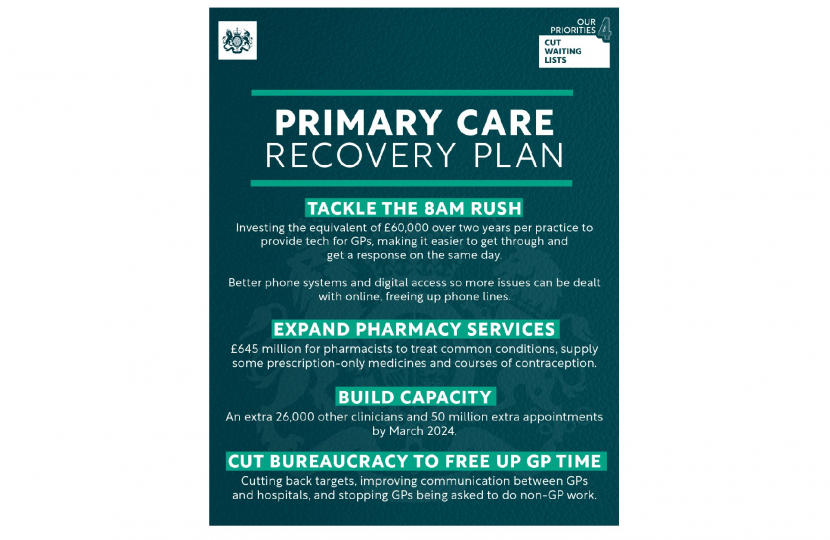
The NHS and the government published a new blueprint this week, set out by the Health Secretary in the House of Commons, to help recover primary care services, meaning millions of patients will access faster care for their health needs from their local pharmacy.
The plan will also end the 8am ‘rush’ for GP appointments, and pharmacists will be able to prescribe medicines for common health conditions, subject to consultation.
For the first time ever, patients who need prescription medication will be able to get it directly from a pharmacy, without a GP appointment, for seven common conditions including earache, sore throat, or urinary tract infections, thanks to government investment of £645 million over two years to expand community pharmacy services.
In a significant new step, up to half a million people a year will be able to self-refer for key services, including physiotherapy, hearing tests, and podiatry, without seeing their GP first.
Almost half a million women will no longer need to speak to a practice nurse or GP to access oral contraception and will instead be able to pop into their local pharmacy for it.
Tens of thousands more people will be at lower risk of a heart attack or stroke, with the NHS more than doubling the number of people able to access blood pressure checks in their local pharmacy – 2.5 million, up from 900,000 carried out last year.
The actions set out in the plan are expected to free up around 15 million GP appointments over the next two years for patients who need them most.
Ending the 8am ‘rush’ for appointments is a key part of the plan, to end patients having to wait on hold only to be told to call back another day for help.
GP teams are already treating record numbers, with half a million more appointments delivered every week compared to pre-pandemic.
Richard Fuller MP said:
The pandemic has had a huge impact on the NHS and our ability to access healthcare, so we must make it easier to access NHS services and cut waiting lists.
That is why the government has announced an £885 million Primary Care Plan, which will tackle the 8am rush and make it easier to get an appointment, support patients accessing some prescriptions from pharmacies without first seeing a GP, and deliver more GPs and GP appointments in our NHS.
This plan will help to cut waiting lists by freeing up around 15 million GP appointments over the next two years, delivering a better service for patients.
In summary, the Primary Care Recovery Plan includes:
- Tacking the 8am rush. Investing the equivalent of £35,000 per practice to provide new technology for GPs, to make it easier to get through and get a response on the same day. We’ll invest in better phone systems, so people don’t get engaged tones, and invest in easier digital access so that many more issues can be dealt with online, freeing up phone lines for those who need to call.
- Introducing pharmacy first. Investing £645 million to enable pharmacists to provide treatment for common conditions. Pharmacists will be able to supply prescription-only medicines for ear pain; severe sore throat; skin infections and urinary infections. They will be able to start courses of oral contraception.
- Cutting bureaucracy to free up GP time. Freeing up around £37,000 per practice by cutting back targets, improving communication between GPs and hospitals, and reducing GPs having to do work that non-GPs can do. Patients will also now be able to self-refer for some services, including physiotherapy, hearing tests, and podiatry, without seeing their GP first.
- Delivering more appointments and more staff. Ensuring that we have an extra 26,000 clinicians and 50 million extra appointments by March 2024. Our forthcoming NHS workforce plan will set out plans to expand GP training. We’re helping retain senior GPs by reforming pension rules, lifting 8,900 GPs out of annual tax charges. Tens of thousands more people will be at lower risk of a heart attack or stroke, with the NHS more than doubling the number of people able to access blood pressure checks in their local pharmacy – 2.5 million, up from 900,000 carried out last year.
The full plan can be read here.
